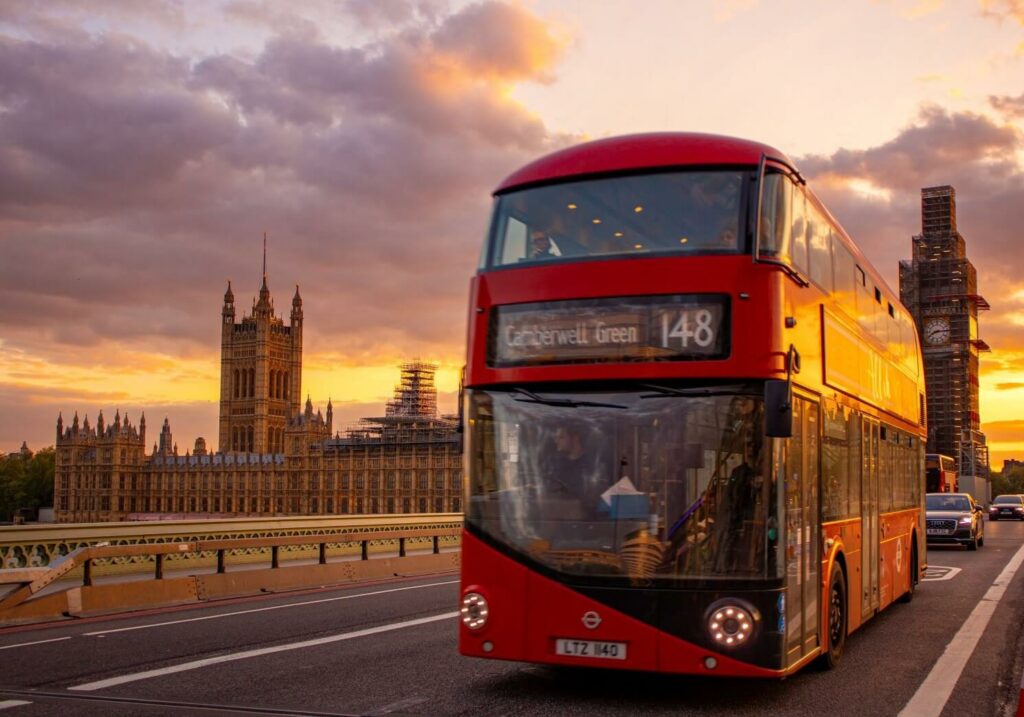Travel Information for Ukrainians
Travel can be expensive in the UK; some areas are helping out by giving free bus passes to Ukrainian refugees. Check with your local council to see if they offer such a scheme. Children and older age people can also usually get free or cheap transport.
On this page
- Getting to your initial destination on arrival in the UK
- Booking travel online
- Getting around in London
- Free bus travel in Wales
- Coach travel
- Money-saving railcards
- ‘Split and save’ train tickets
- Pensioners / older people
- Travel discounts on Universal Credit
- Children
- Train and tube service disruptions

Getting to your initial destination on arrival in the UK
The Government has instructed travel operators to provide free transport for the first 48 hours, in order to enable you to get to your initial destination in the UK (either to your family member or your host). This means you can use any and all means of public transport (such as bus, train, Underground) to get to your destination.
You just need to show your Ukrainian passport and ticket showing date and time of arrival. Note: there does not appear to be an option to pre-book travel online for free.
See https://www.gov.uk/guidance/welcome-points-and-travelling-to-your-sponsor-homes-for-ukraine for more information.
Booking travel online
Sometimes, it can be cheaper to pre-book travel online.
Commercially owned websites such as The Trainline allow you to plan your journey between destinations and they also show you options for coaches, not just trains. You can choose to have your tickets emailed to you as e-tickets, or pick them up from the station at ticket collection points before you travel.
Whilst these websites are convenient, they will charge you a small booking fee for their service, whereas you can book directly with the train or coach service provider to save this. So for example, you can search on the public website National Rail for the same train journey, you will be redirected to the website of the train company to book your ticket and you shouldn’t be charged a booking fee.
Getting around in London
If you don’t have a debit card yet, buy an Oyster card (Transport for London card) from any local shop and add some money on it. The card itself will cost £5 but you can get this refunded when you no longer need the card. The disadvantage of this is that you need to have enough money on the card to pay for your journeys, so you need to keep ‘topping it up’ by buying more credit in local shops.
You can also use a contactless debit card to pay for travel; this takes the money direct from your bank account so you don’t need to ‘top up’ and is easier to manage.
The system is clever enough to work out what is the right price to charge you so that it doesn’t charge you more for a day’s travel than a travelcard would cost. Always remember to use the same card to ‘touch out’ when you finally exit at the very end of your journey as the one you used to start with, or you may be charged the wrong (highest) fare, as it assumes the worst case scenario to decide what journey you actually made.
You should register your contactless card on the Transport for London website, using this link: https://tfl.gov.uk/fares/contactless-and-oyster-account. You can then see all the journeys you have made using that card. If for some reason, you believe you have been charged the wrong fare (maybe you forgot to ‘touch out’ to complete your journey), you can request up to 3 refunds per month. You can register your card even after you have made the journeys, as it will track the last 12 months of journeys.
Buses are cheaper than the Underground tube, which is in turn cheaper than trains. For the Underground, if you need to change lines to get to your final destination, it is ‘one journey’ as long as you do not exit the barriers.
Transport for London have a journey planner which includes buses, Docklands Light Railway and the Underground.
Free bus travel in Wales
For refugees in Wales, a free bus ticket called the ‘Welcome Ticket’ is available until 24 July 2023, when it will be reviewed again. For more information, please see https://www.traveline.wales/free-bus-travel-scheme-for-refugees-welcome-ticket/. A large number of bus and coach companies are signed up to this.
Coach travel
National Express provide comfortable coaches that can be significantly cheaper than trains for travel between different cities.
Coachcards are available for young, senior and disabled people, saving you money on standard coach fares.
Money-saving railcards
If you are a young person, disabled, a family, or over 60, and plan to use trains often to travel between different cities, it may be worth buying a railcard. You pay an annual fee for the railcard, and then use it to get a significant discount on what you would normally pay on the train fare, subject to the conditions of the railcard. Thus, overall, if you travel enough, this may work out to be more economical for you. Rememer to carry your railcard with you when you travel, as you may be asked to show it to the ticket inspector.
See the full range of options available and apply here: https://www.railcard.co.uk/.
‘Split and Save’ train tickets
Sometimes, if you are travelling from one city to another, you can save money by splitting your journey into segments, where the sum of all the individual segments adds up to less than the whole journey.
You don’t need to change trains, but you will have multiple tickets issued. E.g. if you are travelling from A to B, via C, then you may have a ticket from A to C, and then a separate ticket from C to B, on the same train.
See https://support.thetrainline.com/en/support/solutions/articles/78000000442-splitsave for how it works. It’s not available for all journeys, or on all train booking websites, so it’s worth checking a website that offers the option (like https://www.thetrainline.com/).
Pensioners / older people
If you are over 60, you can get free or discounted travel, especially on buses. Check what is available in your local area. For example, in London, you can get free travel on the underground and trains after certain times – 60+ London Oyster photocard – Transport for London (tfl.gov.uk) You will need a letter from a bank as a proof of address.
Travel discounts on Universal Credit
If you are on Universal Credit, you can apply for a Jobcentre Plus travel discount card, for 3 to 9 months (or 18 to 24-year-olds) or 3 to 12 months (over 25s).
You can apply for this through your Job Centre Work Coach and local Jobcentre Plus.
Children
Children usually travel for free or discounted rates. For example, in London, children aged 11 to 15 can get a ZIP card which offers free and discounted travel: https://tfl.gov.uk/fares/free-and-discounted-travel/11-15-zip-oyster-photocard
Train and tube service disruptions
Always check before travelling that there are no disruptions to the timetables. These could be because of:
- Industrial action / strikes by workers (these can be called at relatively short notice, and then also called off, usually just as you’ve rearranged your plans to avoid travelling!)
- Planned engineering works (these usually take place at weekends, and there may be special ‘rail replacement buses’ laid on by the rail operator between the railway stations that the trains would have serviced, but of course, a bus is much slower than a train so you would need to allow more time)
- Unexpected delays (e.g. fatalities on the railway line)
See the following links for information on train and tube services:
- https://www.nationalrail.co.uk/travel-information/industrial-action/ for planned strikes on the train network
- https://www.nationalrail.co.uk/status-and-disruptions/ for status updates on train networks, including strikes and planned engineering works, as well as any unexpected delays
- https://tfl.gov.uk/campaign/strikes for a list of planned strikes on London tube and train networks
- https://tfl.gov.uk/tube-dlr-overground/status/ for live status updates including strikes and planned engineering works on the London transport network, as well as any unexpected delays (usually rare)

